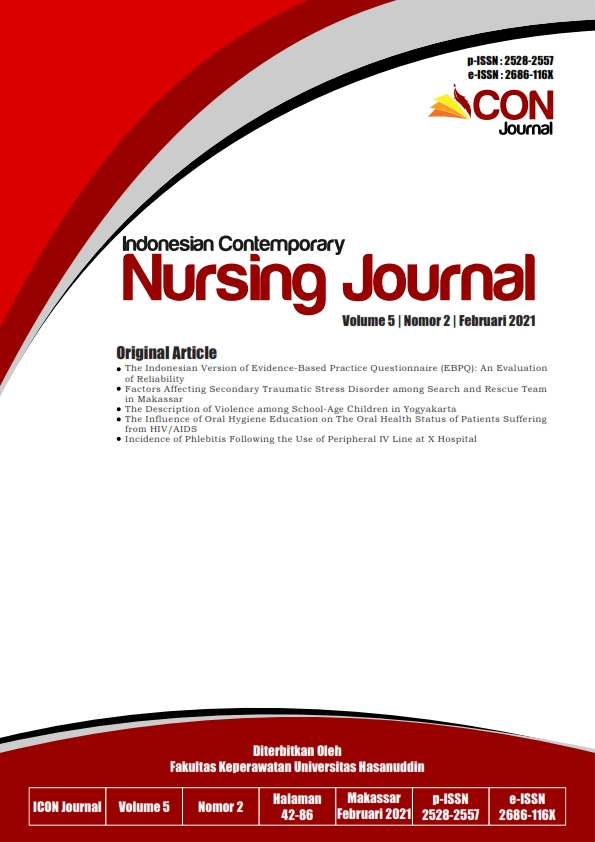Development of Virtual Journal Club for Nurses in Improving Evidence-based Practice
DOI:
https://doi.org/10.20956/icon.v8i2.32716Keywords:
Virtual Journal Club, Nurse, Evidence-based PracticeAbstract
Undoubtedly, Evidence-based Practice (EBP) contributes to enhanced patient outcomes, with nurses being the largest healthcare provider group. Especially in cases of poor patient prognosis, treatment decisions are often influenced by colleagues' successful approaches. Journal clubs prove effective in various learning outcomes, including enhancing knowledge, critical appraisal skills, perceived reading habits, and reading behavior. Virtual Journal Clubs (vJCs) have greater potential to address time constraints, low participant attendance, and other minor obstacles compared to traditional face-to-face journal clubs. Nurses' impact on promoting evidence-based practice is consistent across aspects such as improved knowledge, critical appraisal skills, research utilization skills, interest in conducting research, and nursing skills.
References
Alzayyat, A. S. (2014). Barriers to Evidence-Based Practice Utilization in Psychiatric/Mental Health Nursing. Issues in Mental Health Nursing, 35(2), 134–143. https://doi.org/10.3109/01612840.2013.848385
ANA. 2022. “Nursing World: COVID-19 Resource Center.” Retrieved January 24, 2022 (https://www.nursingworld.org/practice-policy/work-environment/health-safety/disaster-preparedness/coronavirus/).
Billingsley, L., Rice, K., Bennett, M., & Thibeau, S. (2013). Using a multiuser virtual environment to facilitate nursing journal clubs: a mixed-methods study. Clinical nurse specialist CNS, 27(3), 146–154. https://doi.org/10.1097/NUR.0b013e31828c8408
Bleich, M. R., J. J. Schenk, and C. Kress. 2018. “Practical Tips for Facilitating Research in Clinical Nursing Practice.” Leadership and Development 49(7):294–96.
Campbell, S. T., Kang, J. R., & Bishop, J. A. (2018). What Makes Journal Club Effective?—A Survey of Orthopaedic Residents and Faculty. Journal of Surgical Education, 75(3), 722–729. https://doi.org/10.1016/j.jsurg.2017.07.026
Campbell-Fleming, J., Catania, K., & Courtney, L. (2009). Promoting Evidence-Based Practice Through a Traveling Journal Club. Clinical Nurse Specialist, 23(1), 16–20. https://doi.org/10.1097/01.NUR.0000343077.73085.91
Cooper, James. 2021. “Healthcare Expenditure, UK Health Accounts Provisional Estimates: 2020.” Retrieved January 24, 2021 (https://www.ons.gov.uk/peoplepopulationandcommunity/healthandsocialcare/healthcaresystem/bulletins/healthcareexpenditureukhealthaccountsprovisionalestimates/2020).
Diaz, S., & Walsh, A. (2018). Promoting Evidence-Based Practice and Information Literacy through an Undergraduate Nursing Journal Club. Pennsylvania Libraries: Research & Practice, 6(1), 23–38. https://doi.org/10.5195/palrap.2018.171
Kawar, E., Garcia-Sayan, E., Baker-Genaw, K., Drake, S., & Kaatz, S. (2012). Journal club 102: enhancing evidence-based medicine learning using a virtual journal club. Journal of graduate medical education, 4(1), 116. https://doi.org/10.4300/JGME-D-11-00141.1
Kwan, Gary. 2020. “Hong Kong - Country Commercial Guide.” International Trade Administration. Retrieved February 7, 2022 (https://www.trade.gov/country-commercial-guides/hong-kong-healthcare#:~:text=Hong Kong’s total expenditure on,among the highest in Asia.).
Lamar, R. A. (2017). Using a Virtual Journal Club for Sharing Evidence-Based Practice Recommendations in Critical Care Registered Nurses. Teaching and Learning in Nursing, 12(1), 53–58. https://doi.org/10.1016/j.teln.2016.08.006
Lehna, C., Berger, J., Truman, A., Goldman, M., & Topp, R. (2010). Virtual journal club connects evidence to practice: an analysis of participant responses. The Journal of nursing administration, 40(12), 522–528. https://doi.org/10.1097/NNA.0b013e3181fc19c0
Lim, Abram. 2022. “7 Healthcare Cost Statistics in Singapore (2022): How Expensive Is It?” Retrieved February 7, 2022 (https://smartwealth.sg/healthcare-cost-statistics-singapore/).
Mattila, L.-R., Rekola, L., Koponen, L., & Eriksson, E. (2013). Journal club intervention in promoting evidence-based nursing: Perceptions of nursing students. Nurse Education in Practice, 13(5), 423–428. https://doi.org/10.1016/j.nepr.2013.01.010
OECD. 2017. Tackling Wasteful Spending on Health. Paris.
Parahoo, Kader. 2014. Nursing Research: Principles, Process, and Issues. New York: Palgrave MacMillan.
Rodriguez, R. G., & Hawley-Molloy, J. S. (2017). Revamping Journal Club for the Millennial Learner. Journal of Graduate Medical Education, 9(3), 377–378. https://doi.org/10.4300/JGME-D-16-00667.1
Schaefer, J. D., & Welton, J. M. (2018). Evidence based practice readiness: A concept analysis. Journal of Nursing Management, 26(6), 621–629. https://doi.org/10.1111/jonm.12599
Svodova, Jacquelyn, and Shannon Stevenson. 2021. “Preparing Nursing Students to Explore Evidence-Based Practice Using Technology During a Pandemic.” Journal of Nursing Education 60(6). doi: https://doi.org/10.3928/01484834-20210520-13.
Topf, J. M., & Hiremath, S. (2015). Social media, medicine and the modern journal club. International Review of Psychiatry, 27(2), 147–154. https://doi.org/10.3109/09540261.2014.998991
UNCW. 2021. “Evidence-Based Practice Is More Important Than Ever.” Retrieved January 24, 2022 (https://onlinedegree.uncw.edu/articles/nursing/evidence-based-practice.aspx#:~:text=Why Is EBP Important in,with little or no data.).
Zarghi, N., Mazlom, S. R., & Rahban, M. (2012). Challenges of E-Journal Club: A Case Study. Creative Education, 03(06), 708–711. https://doi.org/10.4236/ce.2012.36105
Downloads
Published
How to Cite
Issue
Section
License
Authors who publish with this journal agree to the following terms:Authors retain copyright and grant the journal right of first publication with the work simultaneously licensed under a Creative Commons Attribution License that allows others to share the work with an acknowledgement of the work's authorship and initial publication in this journal.
Authors are able to enter into separate, additional contractual arrangements for the non-exclusive distribution of the journal's published version of the work (e.g., post it to an institutional repository or publish it in a book), with an acknowledgement of its initial publication in this journal.
Authors are permitted and encouraged to post their work online (e.g., in institutional repositories or on their website) prior to and during the submission process, as it can lead to productive exchanges, as well as earlier and greater citation of published work (See The Effect of Open Access).
Accepted 2024-01-30
Published 2024-02-28



